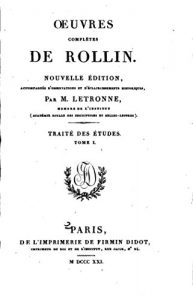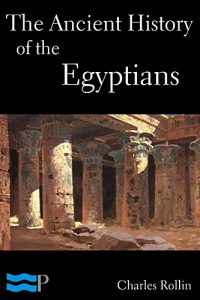Carthage formed after the Model of Tyre, of which that City was a Colony. The Carthaginians were indebted to the Tyrians, not only for their origin, but for their manners, language, customs, laws, religion, and their great application to commerce, as will appear from every part of the sequel. They spoke the same language with the Tyrians, and these the same with the Canaanites and Israelites, that is, the Hebrew tongue, or at least a language which was entirely derived from it. Their names had commonly some particular meaning: thus Hanno signified gracious, bountiful; Dido, amiable, or well-beloved; Sophonisba, one who keeps faithfully her husband’s secrets. From a spirit of religion, they likewise joined the name of God to their own, conformably to the genius of the Hebrews. Hannibal, which answers to Hananias, signifies Baal, [or the Lord] has been gracious to me. Asdrubal, answering to Azarias, implies, the Lord will be our succor. It is the same with other names, Adherbal, Maharbal, Mastanabal, &c. The word Pœni, from which Punic is derived, is the same with Phœni, or Phœnicians, because they came originally from Phœnicia. In the Pœnulus of Plautus, is a scene written in the Punic tongue, which has very much exercised the learned.
But the strict union which always subsisted between the Phœnicians and Carthaginians, is still more remarkable. When Cambyses had resolved to make war upon the latter, the Phœnicians, who formed the chief strength of his fleet, told him plainly that they could not serve him against their countrymen; and this declaration obliged that prince to lay aside his design. The Carthaginians, on their side, were never forgetful of the country from whence they came, and to which they owed their origin. They sent regularly every year to Tyre a ship freighted with presents, as a quit-rent, or acknowledgment paid to their ancient country; and an annual sacrifice was offered to the tutelar gods of Tyre, by the Carthaginians, who considered them as their protectors likewise. They never failed to send thither the first fruits of their revenues, nor the tithe of the spoils taken from their enemies, as offerings to Hercules, one of the principal gods of Tyre and Carthage. The Tyrians, to secure from Alexander (who was then besieging their city) what they valued above all things, I mean their wives and children, sent them to Carthage, where, though at a time when the inhabitants of the latter were involved in a furious war, they were received and entertained with such a kindness and generosity as might be expected from the most tender and opulent parents. Such uninterrupted testimonies of a warm and sincere gratitude, do a nation more honor, than the greatest conquests and the most glorious victories...
But the strict union which always subsisted between the Phœnicians and Carthaginians, is still more remarkable. When Cambyses had resolved to make war upon the latter, the Phœnicians, who formed the chief strength of his fleet, told him plainly that they could not serve him against their countrymen; and this declaration obliged that prince to lay aside his design. The Carthaginians, on their side, were never forgetful of the country from whence they came, and to which they owed their origin. They sent regularly every year to Tyre a ship freighted with presents, as a quit-rent, or acknowledgment paid to their ancient country; and an annual sacrifice was offered to the tutelar gods of Tyre, by the Carthaginians, who considered them as their protectors likewise. They never failed to send thither the first fruits of their revenues, nor the tithe of the spoils taken from their enemies, as offerings to Hercules, one of the principal gods of Tyre and Carthage. The Tyrians, to secure from Alexander (who was then besieging their city) what they valued above all things, I mean their wives and children, sent them to Carthage, where, though at a time when the inhabitants of the latter were involved in a furious war, they were received and entertained with such a kindness and generosity as might be expected from the most tender and opulent parents. Such uninterrupted testimonies of a warm and sincere gratitude, do a nation more honor, than the greatest conquests and the most glorious victories...




![Baixar A Short History of Carthage [Quintessential Classics] [Illustrated] (English Edition) pdf, epub, eBook](https://br.99ebooks.net/wp-content/uploads/2017/05/51JWvw3Oa1L.jpg)






